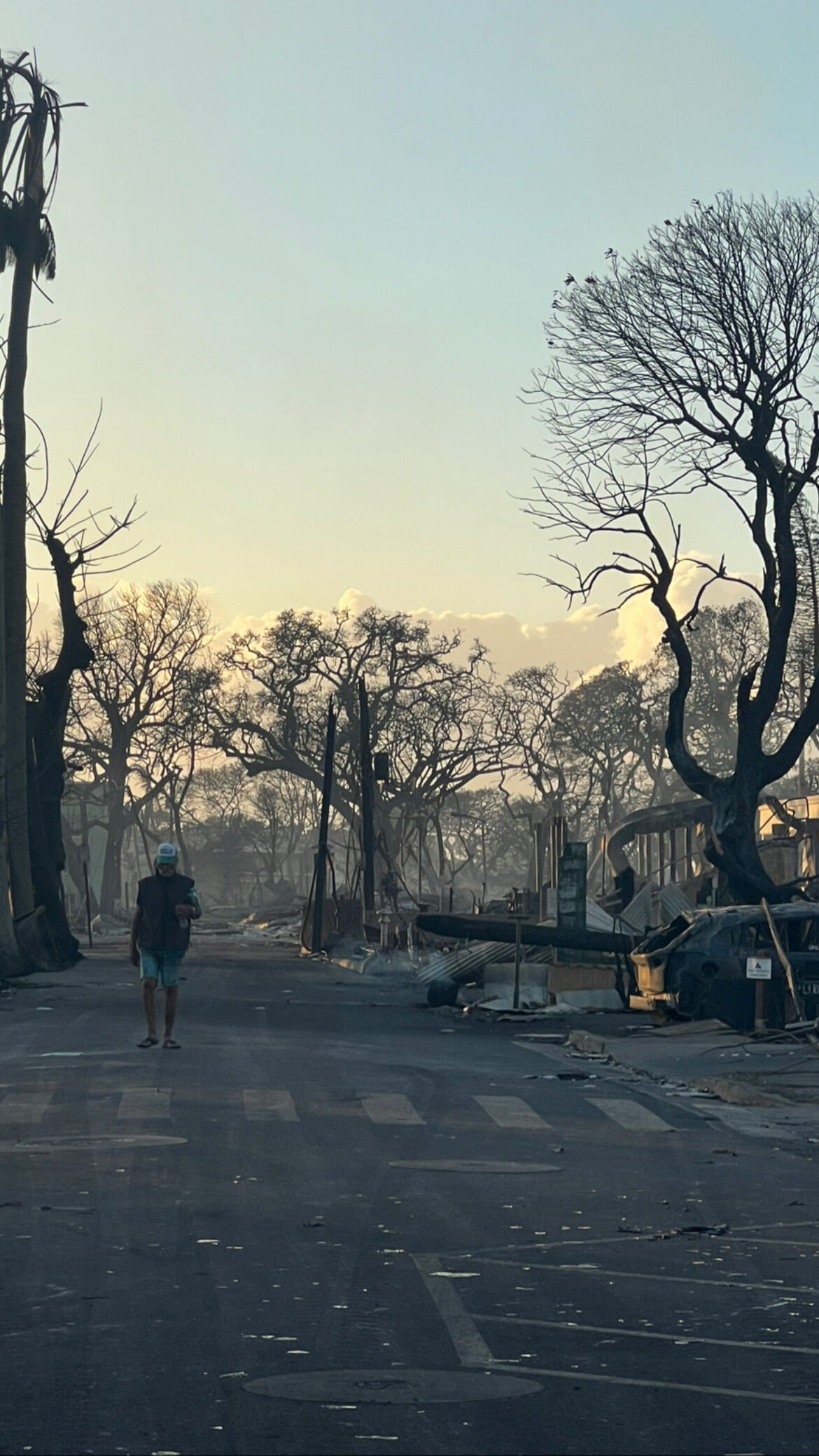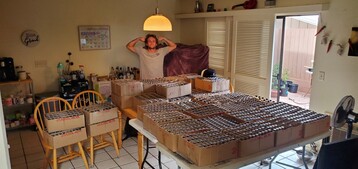Nantucket Native Loses Home And Business In Maui Fires, But Vows To Help His Adopted Island
David Creed •
Just six days ago Cole Millington was a young, 26-year-old entrepreneur living his dream in Lahaina, a small town of just over 13,000 people in Maui.
But the wildfires that have made national headlines as they spread across Maui decimated and displaced thousands of people - including Millington. His home and business were burned to the ground, along with nearly every other structure that existed in the town. He fled that home in his truck with nothing other than his dog, laptop, and the clothes on his back. Today, Millington is working around the clock raising money that can be used to help people in need on Maui.
“There are a lot of questions,” Millington said. “Is Maui going to be a safe place to be? Is it going to be a disaster zone? Am I going to be able to get a job and afford to start doing things again? It's going to be kind of spooky. I know a lot of people are already on their way out right now. A lot of people have left. But my immediate thing is that I just have to be here for now. I have a lot of friends who are missing. I have a lot of friends who are most likely dead. It’s pretty raw. But I need to be here for a while to help this community in any way I can.”
As of Sunday night, the Maui wildfires are confirmed to have killed 93 people, making them the most deadly in the United States in more than 100 years. And the death toll is expected to rise as disaster response teams continue to work through the devastated community.

Millington was born and raised on Nantucket. He went to the Nantucket New School before attending the Brooks School in North Andover when he turned 15. He lived on Nantucket until he was 19 years old and attended the University of Denver - where he graduated in 2019. He has called Maui home for four years and originally washed ashore there as a scuba dive guide.
But the COVID-19 pandemic hit Maui hard. Millington lost his job while Maui completely shut down for 10 months. He said about three of every four residents were unemployed. It created a lot of free time for Millington, which he utilized by cooking. Growing up working in various Nantucket restaurants including the Lobster Trap, Millington has always had a passion for food. He began experimenting with different recipes and eventually made a hot sauce his roommates fell in love with.
“They're like ‘Man you got to try and sell this or something,’” Millington said. “So, I gave it to all of my friends and my neighbors and everyone loved it. Then I went to the farmer’s markets when they started opening up. I just started to brand it around my favorite surf spot on Maui: Honolua Bay. It kind of just kept taking off organically. It was in about 15 stores on Maui. I shipped to almost every state in the United States. I made about 10,000 handmade, hand-poured bottles in just under three years.”
The company was called Honolua Hot Sauce and Millington was preparing to take the next steps to take his business to the next level. But in the aftermath of the fire, all of Millington’s paper files, ingredients, bottles, and product are nothing but ash.
“Now there is just a pile of smoldering bottles in the rubble of my home,” he said. “My roommate was actually able to get back to that side and take a couple of photos. I’m pretty much back to zero."

Millington recalls looking out his bedroom window just after 4 p.m. on August 8th and seeing a huge plume of black smoke. He said he told his roommates that the situation outside looked pretty serious and suggested that they leave.
“We were experiencing 50 miles per hour winds with 90 miles per hour gusts,” he said. “We were having hurricane conditions from a hurricane passing south of Hawaii. We’re in a rain shadow in Lahaina so we've been in a severe drought for years. So heavy winds and no rain in combination with us having old telephone lines that are still above ground all over, every single telephone line broke in Lahaina and started this fire. So within about 10 or 15 minutes, we were all running into our cars peeling out of the driveway.”
Millington said he did not get an emergency response or alerts to evacuate until he was already in his truck leaving.
“There were people screaming on the streets. There are telephone poles blocking roads. There are trees blocking roads,” Millington recalled. “There's only one road that comes in and out of Lahaina so in an emergency evacuation like this, I pulled onto the main road and there were already thousands of cars in front of me. While we were in standstill traffic I could see fire crossing the road in my rearview mirror potentially affecting cars. I didn't see that happen or any cars exploding but I'm sure people were starting to get out and run away from their cars.”
Millington said the fire consumed nearly the whole town in one to two hours. There are still six uncontrolled wildfires ravaging Maui.

“I related this to the great fire on Nantucket in the 1800s,” he said. “It took over the whole town and the only things that were left standing were the brick buildings in Lahaina. Everything is hundreds of years old.”
Millington escaped to Kihei, which is about 20 miles east from Lahaina, but his stay was short-lived. As he and the other refugees prepared to go to bed and decompress a bit, their phone alarms went off telling them to evacuate Kihei because “it might be on fire.”
Millington, along with 14 to 15 other people, then relocated south to a family farm in Waihee-Waiehu where they are all currently squeezed into a one-bedroom apartment.
“I am still a lot more fortunate than a lot of people who are suffering. This is all still so dire,” he said. “There are people with 50 people in their homes right now and there are people using their own paycheck to pay for a household of 50.”
Even after losing so much, Millington has remained strong and rather than plan for what’s next in his future has instead spent hours upon hours trying to raise money and assist the West Side of Maui in any way he can. He created a GoFundMe called “Help Victims of the Maui Fires” the next day in collaboration with The R.E.L.I.E.F. Foundation, a 501c3 that has assisted communities facing natural disasters such as Hurricane Katrina, the Haiti Earthquakes, Houston Floods, and more. This foundation works with people such as Millington who are on the ground in areas where natural disasters are taking place and need assistance raising funds.
Millington has spoken on several news stations, including CNN, to help raise awareness of how bad things have gotten in Maui. He has also spoken to audiences internationally through TV and radio in other parts of the U.S. as well as other countries such as Ireland, Vancouver, and London.
“My focus really is not on me right now. I’ve got enough avenues where I'll be able to figure out what happens to me after this,” he said. “My complete focus right now is on my community and the people who don't have family who can help or a place to leave to if they need to. A lot of these people are native Hawaiian Kanaka families who have been in Lahaina for generations and hundreds of years. Their homes are gone. Their legacy is gone. Their community is gone.”



He said from the very beginning, Lahaina welcomed him “with the most Aloha” and that Nantucket has always been intertwined with the town and Maui in general through their whaling history.
“The whaling history of Lahaina and Nantucket are extremely connected,” Millington explained. “There were always Nantucket stickers in various stores in Lahaina. I've seen connection of Nantucket whalers – the capital of whaling in the 1800s – they would come to Lahaina behind a town specifically where I lived. So that's a big reason why I felt so at home immediately when I was there. It was a small town, old whaling town vibes so I immediately was like ‘This is my home. This is my community.’ It is just the most caring community I have ever experienced in my life.”
He said Lahaina is considered to be the heart of Maui when it comes to the island’s economy since the town is focused primarily on tourism. For that reason, he plans on remaining in Maui for the foreseeable future to help the recovery process along.
“And without that beating heart Maui just had a heart attack and people on every corner of the island are afraid and asking what's happening now,” he said. “I'm going to be here on Maui on the ground for as long as I can. If I feel like I'm taking up resources from people who need them, I’ll end up leaving. But I plan to be here for the next couple months and if I can, the rest of the future. There are going to be a lot of changes. Half the island lost their jobs from this. Half the businesses are gone.”
“We need to figure out how to help the community because we feel that the immediate disaster relief is not here on a greater level that it should be,” he added. “It's a community that is helping and supporting each other right now. And that's really about it.”
